#while CF did that too it happens no matter what but AM relies on a side character being alive and present for it to happen
Explore tagged Tumblr posts
Note
I do feel kinda bitter over AG though because of all those things you mentioned since i cant look at AM the same way for not having a lot of those things
I can get that. I feel a little similarly. Overall I like AM more because it really delved into Dimitri’s trauma, but AG definitely handled the Blue Lions’ friendships better. What I didn’t like about AM’s characterizations for Sylvain and Felix in AM is that despite five years having passed, they didn’t mature nearly as much as they should have. In comparison, AG was only two years of a timeskip and it felt a lot more fleshed out with their characters. Ingrid was on a lesser scale, but she definitely got the better end of characterization in AG.
In part I think this is also because the writers have had time to decide on some things. When they made Houses, it was a new game. With Hopes they were working with pre-existing characters, so it was probably a lot easier to flesh them out and change their behavior. It just feels weird to look back at Sylvain from a five year skip and see that he hardly changed, but with a two year skip in an AU he’s a much more mature and composed version of himself.
AG also gives us the possibility of having Rodrigue to the end, and I’m wondering if that was a decision the writers made because they saw how he was received and decided to swap his position in the story with Gilbert who was a less popular character. Having the possibility of losing him is like a callback to AM, but we at least have the option this time. There’s also the chance for us to get supports for him with the characters that needed to be more fleshed out in their relationships with him.
Granted, in AM Rodrigue died because that was the final nail in the coffin for Dimitri’s mental state. He needed to have that moment where he gave up entirely and stopped caring about everything, planning to just go out and kill Edelgard or die trying. Byleth was also able to prevent it because they spoke with Rodrigue the night prior and could bring Dimitri to his senses through what they learned when speaking with Rodrigue. In that sense I think it was too important of a scene to leave out, because if not Rodrigue, I don’t believe any other death could have impacted his story to reach that point.
For example, in Ailell Dimitri behaves the same way to everyone around him. When they meet up with Rodrigue, that’s when his manner of speech starts to waver and he is, for the first time in five years, scolded and essentially told to shut up and listen. With Rodrigue being, as Dimitri literally says pre-skip, a second father to him, he didn’t treat that situation as he would have with anyone else, ending it with referring to Rodrigue as his friend (which is more than he did for anyone else by that point, too paranoid and being unconvinced that everyone wasn’t his enemy. The one person he knew would never be his enemy was Rodrigue).
Since the stories are vastly different in both games I do get why things were altered. Going back to AM will just be unfortunate that Rodrigue fans can no longer use him as a playable unit or get all the character lore we got in AG (which was a whole lot tbh for the parent generation, as well as his relationships with the people around him). We also have things like Gilbert coming back to the Kingdom much sooner and thus mending his family relationships, bringing back the old Gustave who is fiercely protective of his family to the point he won’t tolerate any enemy laying a single finger on his daughter and brother. I love seeing him in SB as an enemy and getting to see how aggressive he really is when someone tries to harm his family. To me that shows us who he used to be before Duscur.
I guess in the sense of like, for the sake of fanfics I’ll probably love keeping both stories in mind and mixing the two for things like characterization. Like I said, I understand that they were reusing already established characters so it was much easier to create new situations and improve the characters (to which tbh I’d say was usually hit or miss, like how I can’t even begin to imagine what they were thinking when writing Caspar for Hopes but they did so, so good writing for Lorenz).
Really I guess it’s just kind of what happens when they use existing characters and improve upon them when the original story was already so good. I’m going to hate going back and not having all the Rodrigue content because he’s one of my favorite characters in the franchise itself. On the other hand I’ll like returning to all the sides of Dimtri’s character, because having that aspect of such severe mental illness I think is really important to use in media, particularly in our modern day where that’s a big and largely important topic in our society. While I’d say they also made the attempt with Takumi in Fates, at this point Fates is not a very well loved game and due to how it was handled overall, I think a lot of the attempt at mental illness and suicidal behavior went over people’s heads due to of how poorly the rest of the game was received by players (and admittedly the writing wasn’t nearly as clear with Takumi as it was with Dimitri).
Houses kind of has the vibes of like... a whole lot of “what if” situations that AG used to show the answers of that. SB is more of like... another rendition of Edelgard’s story with not much changed except that we get to actually fight Thales instead of the characters defeating TWS post game. GW is the total opposite of VW, so rather than creating it as a “what if” timeline like AG it’s more of a “what if they went the opposite path they took in VW”. AG focuses more on the possibilities that existed in AM and builds upon those, rather than SB’s choice of the same route but handled differently and GW’s choice of seeing what it would look like if VW was turned on its head (no upside pun intended...).
Technically it’s not bad in and of itself for them to have written SB and GW in those ways, and that’s not to say AG is just absolutely the best because of it. It comes down to personal preference and I saw a lot of people saying the same thing that they see SB as more of a retelling but altered CF, which at that point it’s up to the individual if they prefer the new or the old. GW’s plot in and of itself wasn’t an issue, but it was the treatment of its characters and how the plot wasn’t focused on the characters but instead focused on altering its characters to the plot instead of the characters being what made the plot (ex. AM being written to follow Dimitri, not Dimitri written to follow AM).
Following that thought too, AG follows the formula of its characters being the story itself because in SB and GW, the characters go here and there and everywhere and they’re dragged along. In AG if you try to suggest that you go west during a civil conflict, you’re basically told no, we can’t afford to do that and have to stay here where we already are to deal with this problem and we can head west after that. You’re in one place and kept in that place until the conflict is resolved, rather than being pulled west and then having to go back to where you already were.
In some ways I guess you could say AG was written too well, because now when we go back to AM we’re missing all those improvements on the writing. I do prefer chapter 19 to chapter, what is it, 9 or 10? with the way Claude allied with Dimitri because it felt way more natural in AM and was rooted in a trust that was forcibly finnicky in AG because they were trying to sneak in concepts of GW Claude and how he wasn’t someone people ordinarily trusted. Instead of writing him as just a different path Claude, they tried to keep aspects of him that applied to very different routes and it wound up feeling wonky. AM was much more rewarding, and even more so because Gronder had already happened. Comparably, AG Dimitri and Claude had not even fought each other and yet everyone except Dimitri (and presumably Seteth and Rhea based on the dialogue when they all met up) was highly distrusting of him and treating him like he was some infamous slimy plotter who was going to jeopardize something. It was very forced and kept trying to nudge at GW/SB Claude, so for me that was extremely awkward to see considering in AM, nobody really highly distrusted Claude when he asked for aid. They’d never even fought or had problems in AG, but for some reason most of the cast didn’t want to trust him.
Regarding Thales though, for sure AG did handle it way better. I don’t really like Edelgard’s story in the second half of AG since I prefer AM’s ending for Edelgard (and it makes more sense because she was hellbent on fighting to the end, even if her path killed her. Dimitri gave her a final chance to end it alive, but she willingly chose her death and for her that could’ve been a matter of pride which is more in line with her character, but AG took her character away entirely so that just wasn’t a possibility). Thales imo should’ve been the final boss in AM too, having escaped as Arundel in chapter 19 and fighting the Kingdom later on. Considering how deeply rooted in Dimitri’s entire backstory Thales is, it’s kind of insane to me that he wasn’t the final boss. He has the least connection to Claude but is the second to final boss in VW instead.
For me the perfect ending would’ve been like... a mix between the two, where Dimitri had to come to his senses because Rodrigue almost died but he survives just barely. Perhaps he can’t fight for the rest of the war, thus rendering him unplayable as a unit and making sense as to why he couldn’t be playable from beginning to end. Sylvain, Ingrid and Felix would have grown into who they became in AG when you get to the five year timeskip in AM. Obviously Dedue would keep his story about saving Dimitri with others from Duscur, but then maybe soldiers from Duscur continue to fight with the Kingdom army the way they do in AG. We’d have AM’s version of the Alliance getting the Kindgom’s aid, and we’d have Thales escape as Arundel but fight the combined armies later on. Maybe while they were allied, the Kingdom gets news that people from the Alliance, maybe even Holst, located TWS’ base (since they’re near Goneril territory I think?). Since they were basically one big army, Dimitri could defeat Edelgard as we know their battle to happen in AM, but then they could travel to the Alliance territories with the war being over now and from there, fight Thales and have Dimitri learn the truth. Maybe Rodrigue joins as an NPC in the final battle so that he can be present against Thales, even if he’s not fully recovered because he feels he has to be there since it’s the battle for the truth that he’s been waiting on since he lost his best friend and son.
Whether or not Nemesis would be at the very very end idk, but I think Thales at least should’ve been the final or second to final boss like how he was the latter for VW. I think it would also be nice if Claude hadn’t left right away and instead joined the joint armies, even if just as an NPC since in this case you’d be traveling through the Alliance to fight TWS, and since they’re in Alliance territory I think it would make sense for the Alliance to be much more invested in that fight. It would give Claude the truth he’d be seeking in VW, thus giving a nod to his story in his route, and would give Dimitri and everyone else the truth about Duscur. It would be a complete story imo that way with all loose ends tied up, and if they had Duscur soldiers show up with Dedue in the timeskip then they’d be there too maybe as some NPCs in the final battle, so their story would be concluded too with the truth proving their innocence. Imo it would be a perfect way to resolve the whole Duscur storyline.
I know they were probably going for an imperfect ending in AM in the sense that we can’t have everything, but the only problem with the way they wrote that out was that Duscur was the focal point of AM. At the very least I think they should’ve tied up that entire story from beginning to end, concluding it with everyone learning the truth and Faerghus finally being able to heal when the truth gets around that Duscur’s people didn’t kill their king. Not only do the characters we’re familiar with have resolution, but the actual story we’ve followed right from the start is finished in full.
The problem with ending it with Edelgard for AM is that Edelgard... wasn’t really the true enemy of AM as a route. She was Dimitri’s personal enemy and conflict and he would have to fight her if he was going to end her war, but with the way the actual plot goes, Edelgard should have been AM’s penultimate battle, exactly like how Dimitri is CF’s penultimate battle before she reaches her actual enemy and goal, Rhea. Edelgard’s war was most specifically against Rhea, thus why her route made Rhea the final battle and not Dimtiri. AM should’ve followed that same formula, because Edelgard’s overall gripes weren’t Dimitri himself. Similarly, Dimitri’s story and the plot itself was centered around Duscur and the truth, which defeating Edelgard doesn’t solve a single part of. It concludes Dimitri’s personal arc with his step sister, but it resolves absolutely none of the plot of AM. While it resolves a character arc within the plot, the plot itself remains unfinished.
Like I said, I get the whole idea that we can’t get a perfect ending, but in this situation I don’t think it’s even about a “perfect” ending anymore. You could argue that this ending still should be present even if Rodrigue still died. AG is in a better position for the plot because it actually thoroughly explores the true plot of Dimitri’s background as a character. AM is a character centric ending, but AG is a plot centric ending, and I hate that we don’t get both in either of them. We either get a very good character heavy story, or we don’t get the full depth of the characters (ex Dimitri’s mental state not really being a problem in AG and is only sometimes given a nod to) and have a completed plot.
Hence, I feel like for fic’s sake and headcanon’s sake I like to think there’s more to the point of the Alliance fighting alongside the Kingdom as one army and that the plot related final battle would be against at least Thales if not Nemesis (since Nemesis himself isn’t relevant to AM’s plot or any of the characters, but Thales is deeply involved in multiple characters’ lives). Also, it could maybe give resolution to Dimitri’s personal story with Edelgard, learning that Arundel was killed and that was why he stopped donating, and realizing why Edelgard changed so much post her stay in the Kingdom. Just a final battle against Thales alone would conclude both the story and character plots and make a full, true ending. AG technically has a full, true ending to its story since Edelgard wasn’t in a position to continue her war, so whether she lived or died becomes irrelevant at that point since what happened to her, whether we enjoyed that aspect or not, did resolve that particular conflict. In that sense, yeah, AG solved pretty much everything in one shot.
So yeah, I totally get why you feel bitter about it. AG had an actually conclusive plot while AM was just left hanging as an incomplete story. CF was “complete”, i.e. TWS was defeated post game, and VW was a fully complete story. Instead in Hopes, GW is left a huge question mark and incomplete and SB is still basically complete unless Edelgard continued her war for conquest, so that one is more like... complete(?), with that question mark being necessary. AG is basically complete, since what happens to Edelgard doesn’t really affect the plot which was finished.
Considering TWS is the center of AM’s entire backstory and Dimitri’s most intense trauma, you’d think that would be much more important to the story in AM and that Edelgard wouldn’t be the end of the game. I wish they were still making DLC or updates or something for Houses, because it would be so great if they added that as a late attachment to AM (like how, if you know Tales of Graces, the game ended up releasing and then re-releasing with an entire post game arc added, though in that case it was more of a remake because it was titled differently, adding “F” to the end of the title to indicate there was an addition to the game and changes made/added).
#Three Hopes Spoilers#sorry this kind of turned into a whole analysis of like...#why AG is a complete story and why AM is not#and how that can absolutely make AM fans a little upset at how good but incomplete it was#compared to AG which was a great story and also a completed plot#I love them both but it's still gonna be a bummer for me as a huge Rodrigue fan to go back to AM and have less content of him#Felix's story was also kinda left incomplete in AM but was handled far better in AG whether Rodrigue survives or not#Sylvain's story got more substance both with his family and Sreng in AG and in AM that's pretty much loose particles in the air#technically Sylvain probably lived with Miklan again and if he didn't he at the very least had Miklan in his life again#and Sreng was a topic more often and even given a paralogue while in AM it's just kinda... a background ''this happens sometimes''#both of those aspects were extremely helpful for Sylvain as a character but he was given literally nothing in the timeskip#his substance is his supports and in the main game he has almost nothing that he didn't already have pre-skip#I feel like we sacrificed a lot by making AM so heavy on Dimitri's conflicts with Edelgard bc like#it's fine that the story centered around HIM since he's the lord of the route#but the overall conflict ending with her was only a resolution to a character arc and not the actual plot#so AM is just kind of sitting there like... if you happen to have Hapi she just happened to have defeated TWS post game#while CF did that too it happens no matter what but AM relies on a side character being alive and present for it to happen#meaning before the DLC there was no indication of TWS being stamped out after Thales died#AM is definitely a great route but its actual plot was a disaster. CF had a messy plot with a disaster incomplete ending#VW and SS had complete stories and full character arcs so I don't feel like GW really hampers VW#SB could be seen as a more complete and better version of CF (especially since it's LONGER than CF just for starters alone)#so I wouldn't be surprised if CF/SB fans felt similarly about SB being more complete like how AG seems to feel for AM lovers#it's kind of just a problem with Houses in general that a lot of story threads were left unfinished#DCE Ask
21 notes
·
View notes
Text
Sacrifice for the Three Lords
So. Got curious about something.
Curious thing got long lol, under the cut
The word sacrifice has a very loaded, very intentional feel to it. For something to be sacrificed, it must be considered less than whatever it is being sacrificed for, whether in the moment or in the long term - it’s the logical conclusion to the act itself. Even if regret for that choice can come later, at the time you are sacrificing whatever is being sacrificed, it is considered less (for example, spending an hour of your time for a stupid meme post you spent too much time on, for a light-hearted start. In hindsight you might think it was stupid or not worth it, but at the time of bungling around in photoshop you considered the time lost as a worthwhile sacrifice to your end product).
With that in mind, how do the three lords view sacrifice? When is it mentioned in their routes? When do they themselves mention it, and what are they pertaining to when they do? I want to focus on the word “sacrifice” specifically, due to the already mentioned connotations and meaning attached to this word in particular
We’ll start with Claude, with his route’s first mention of the word sacrifice being, and I’m not kidding, post ts, at Ailell
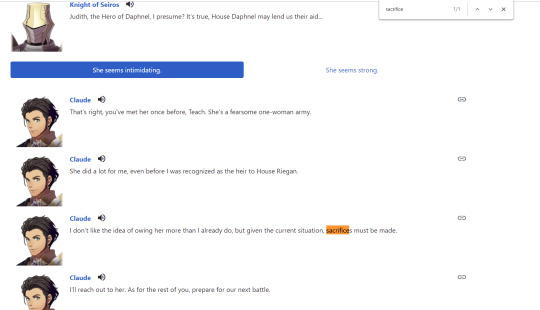
What is being sacrificed here is Claude’s independence from Judith. He is expressing a want to not rely on Judith’s help once again but needing to give up that want in order to move on with his goals of winning the war. This is something that he alone is sacrificing with no involvement or need of sacrifice from anyone else - he is the only one losing something from this sacrifice.
The next mention is from Hubert’s letter

The sacrifice being mentioned belongs to Edelgard. Hubert is stating that Edelgard has made sacrifices that must be honored, heavily implying that they were necessary for her goals if they hold such importance as to keep that importance beyond the grave to be passed by those who have defeated her. Claude himself is not sacrificing anything, nor does he state any agreeance to the phrasing used here, but he has said earlier that her methods use too much bloodshed for people to rally behind, implying a disagreeance.
This is the last time the word sacrifice is used in direct relation to Claude. When it comes to all that has happened to others, Claude specifically does not refer to it as something like a sacrifice that he is making.
Though that does not the word is not used further in VW. Dorothea, in VW:

The sacrifice being made here is deliberate and willing on the part of Count Bergliez. He is making the consenting, thoughtful decision to sacrifice himself because he views his men’s lives as more important than his own, and it is implied that his doing so achieved the desired outcome (the safety of his men). He came to this decision by himself, with no outside force making him do this (outside of the circumstances that prompted it - no one person made him do this). The act of sacrificing yourself for the lives of others is portrayed in a explicitly “positive” light coated in tragedy and even then only if it achieved its goal
Lastly, for unique mentions on VW, Annette:
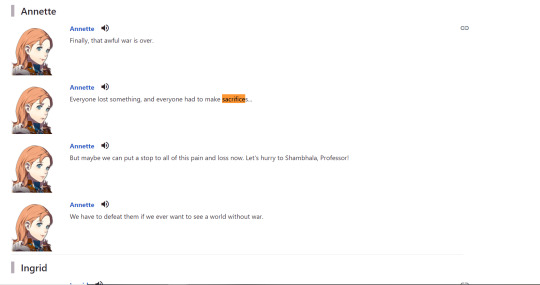
Forced sacrifice is seen as something painful. The making of circumstances where sacrifices must be made outside of the will of those making it is portrayed in a explicitly negative light that is sought to be rid of.
In VW, Claude himself never refers to the loss of life as a sacrifice, and only ever refers to something as a sacrifice when it is him making it in a way that does not affect others. Sacrifice of life is only referred to as “positive” when either 1) Hubert, an amoral character who cannot be part of VW, makes mention of it, or 2) it is the singular sacrifice of one person’s life that they made of their own volition in order to save others, and even then it is portrayed in its context and in later contexts as a tragic event nonetheless
Next: AM
The first mention of the word sacrifice for AM - or in this case, BL - is after Lonato:
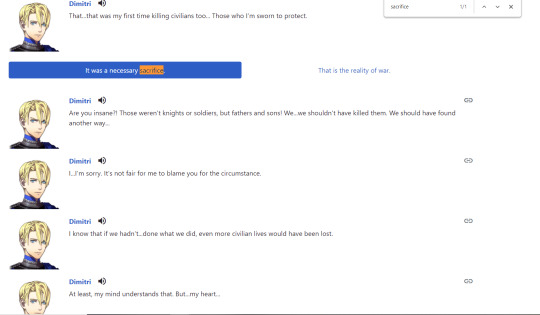
The word sacrifice is not brought up by Dimitri. Byleth says that the loss of life must be accepted, the result of which is explicit denial from Dimitri of the supposed importance of sacrificing civilians. Sacrifice of life -and the direct phrasing of it as a sacrifice - is explicitly portrayed as bad in the eyes of Dimitri; he does not believe that life ought to be sacrificed to achieve one’s goals
Next time, post ts:

The sacrifice of lives is directly, verbatim described as needless. The concept of the idea of lives being less worthy than a cause is explicitly called wrong. Human life is given more value than any goal.
Note how this is a direct reference to his behavior in VW, where he sacrifices his life as well as those around him - save for Dedue, whom Dimitri not sacrificing is what allows VW’s story to continue (due to Dedue providing the blueprints to the throne room for the Alliance army to navigate through). Dimitri’s choice to deliberately not have Dedue sacrifice his life is a positive to the overarching story of VW, while his indifference to the now explicitly needless sacrifice others’ make of their own lives for his personal cause is portrayed in a negative light
And while we’re talking of Gronder (note, this also appears in VW and thus also applies to VW):
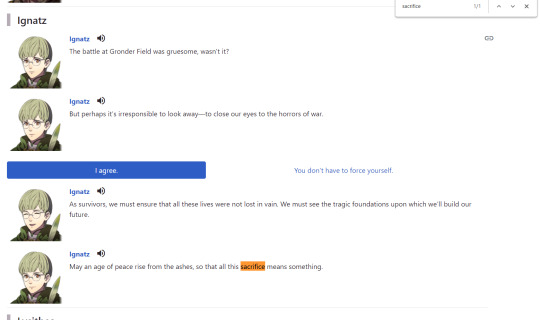
Ignatz’s further implies that the sacrifice made at Gronder does not mean anything - it is senseless, and without purpose. It must be given meaning after the fact; it holds nothing in and of itself, as it did not bring about its desired outcome
Next, Catherine:
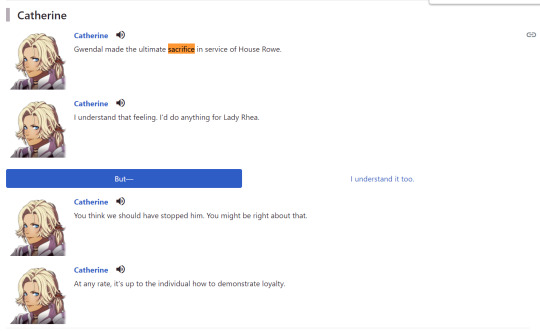
Sacrifice of the self is seen in an understanding light while simultaneously being seen as something that ought to be avoided. It is also something that is shown to be something that must be up to the individual to decide for themselves, though is regardless seen as something that likely should be talked out of doing
Last for AM, Felix:

The voluntary, willing sacrifice of one’s own life, for the betterment of others, is portrayed as something “positive” that must be repaid by those which the sacrifice was made for. It is not something that can be morally justified in forgetting after the fact - the repayment needs to be made in order for the sacrifice to be “positive.” The intended outcome of the sacrifice must be fulfilled in order for it to be seen as good.
In AM, sacrifice is continuously referred to negatively. Dimitri outright denies the possibility of necessary sacrifices, and the only way sacrifices are seen in a “positive” is if they are 1) willing made by the person sacrificing themselves and/or 2) the desired outcome of the sacrifice is definitively achieved, with the latter stipulation still having caveats that prevent it from ever truly being seen as positive (Count Rowe)
Lastly: CF
Edelgard mention the word sacrifice the same time as Dimitri first does, after Lonato:

Sacrifice of life is seen as a necessity. Edelgard views sacrifice as something that cannot be avoided, and as such, she has no qualms in sacrificing her people’s lives to achieve her goals. She views her cause as having an inherit superiority over the lives of the people.
Next, during the invasion of Garreg Mach (once you’ve settled on CF as a route):
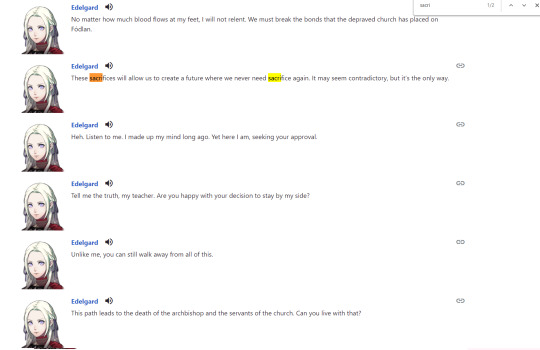
Sacrifice of human life is once again seen as a necessity for Edelgard to achieve her goals. She states that she will not stop no matter how much blood she spills for her cause. The sacrifice of life is involuntary to those making the sacrifice, and yet it is seen as something that will lead to a positive outcome. The cause is given greater importance over human life.
Next, post ts, before Claude is fought:
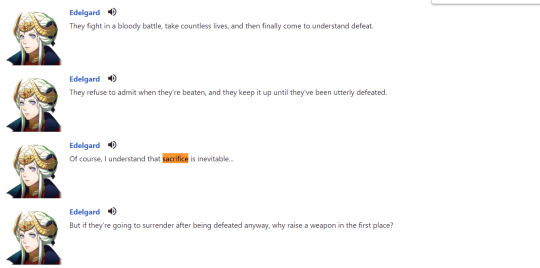
The want to not sacrifice own’s life for their cause is seen as a negative. The idea of attempting to save one’s own life at the prospect of certain defeat is questioned in its rationality. There is a lack of understanding in the idea of not sacrificing one’s self to the cause - this is further shown in Edelgard’s death in all other routes, which is caused directly due to her unwillingness to give up her greater cause. She views her own human life as having less importance than her goals, which is consistent with her ideology of sacrificing everything for the greater good.
Notice the other two mentions of the word sacrifice in CF
Linhardt, at the final chapter (which appears in all routes, mind, but since he does default as a BE I feel it pertinent to include within the CF section):
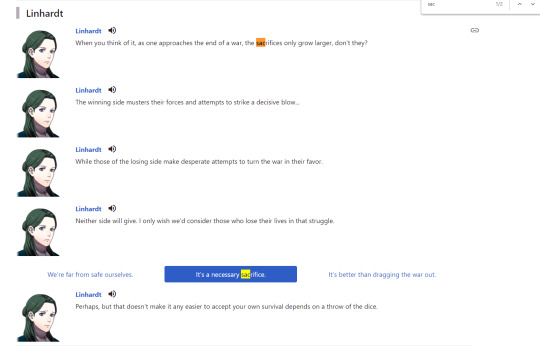
Sacrifice is seen as a sign of desperation. The idea of sacrificing human lives for a greater cause is no longer comforting or a good enough justification. It being described as “depend[ent] on a throw of the dice” directly implies no control from the one(s) sacrificing their lives.
And the last mention is from Rhea, during the last battle, referring to Rhea burning down Fhirdiad:

Sacrifice is being actively questioned. Edelgard’s reaction to Rhea forcibly sacrificing lives showcases the act as negative. Rhea, in all other routes, is one of Edelgard’s sacrifices she makes for her cause, and now Rhea’s mirroring of sacrificing the people’s lives for what she believes is right is being shown in a explicitly negative light. This is not Edelgard growing to realize that sacrificing human life is wrong as she does not reflect on her own doing so when she criticizes Rhea for the same thing.
In CF, when it is Edelgard speaking of sacrifice, it is always seen as a necessity - something that must be done in order to achieve change. Edelgard actively forces sacrifice on the people due to her believing that her desired outcome cannot be made without it, and so she makes little effort to mitigate this involuntary, large-scale sacrifice.
But, when similar ideals of the value of human life against one’s own cause is applied to those which oppose her, she no longer sees it as morally justifiable to sacrifice the lives of the people, despite her own willingness to do the same. When sacrifice is seen through the lens of someone other than Edelgard, the idea of sacrificing lives for the greater cause is no longer enough to justify it.
In contrast to Claude and Dimitri, who do not view such sacrifice as a necessity and thus do not attempt to justify it/force it upon others (except when Dimitri explicitly is doing something wrong, as directly stated by the game), Edelgard cannot fathom the possibility of being unable to sacrifice human life and achieving her goals at the same time. In contrast to Claude and Dimitri, who hold human life above their goals (except when Dimitri explicitly is in the wrong), Edelgard holds her goals above human life. Human life - including her own - has less worth than her goals, thus making it acceptable to sacrifice.
And, well. Considering that people are still being killed in most of Hubert’s endings due to all of the revolts and rebellions against Edelgard’s abrupt, violent, bloody rule rising up, the commonfolk are still not able to receive titles/military credits unless they marry into families which already have that (save for one character, who was previously noble already), and that freedom of choice is not guaranteed as shown by Bernadetta’s endings, along with the slew of other problematic elements in CF’s endings (especially when compared to VW and AM, whose endings portray a far more peaceful Fodlan)... yeah, the sacrifices absolutely did not achieve their stated desired outcome. And that’s when they were voluntary
#anti edelgard#Anti-edelgard#Edelgard discourse#Edelgard critical#just to be safe#and to be clear - Dimitri did not force sacrifice on his men on Gronder#but more that he only explicitly tries to save Dedue by telling only him to retreat if he's in danger (falls in battle)#he - in that moment and in specifically VW which is his lowest point character wise - has little care for the safety of his friends#Dimitri states that it's him sacrificing his friends when it's more accurate to say he was indifferent to their safety (barring Dedue)#hence the phrasing in that part#but uh like#overall#ignore my ass if this seems too reachy lmao#i just thought it was interesting to look into how each lord uses the word sacrifice specifically#since it holds such a dramatic and intense feeling to it#but i can see how it can sound kinda meh as a premise for analysis lmaooo#feel free to tear it to shreds lol
35 notes
·
View notes
Photo

(via Now That’s Some Serious Chronic Fatigue. Spoon Theory 2.0? (Patreon Link Within))
October 4, 2019
Many chronically ill people eventually learn about the “Spoon Theory” of chronic fatigue, which is basically a way to explain to healthy people what it’s like when you no longer possess (or never had) virtually unlimited mental and physical energy to do what you want. Because it’s always the responsibility of the weakest and sickest to explain ourselves to healthy people innit. A person’s spoons are a visual representation of their physical and mental energy reserves for the day, where a physical or mental activity “costs” one or more spoons to perform and when the spoons are gone the sick person has no choice but to stop acting and rest. With adequate rest and recovery time, hopefully their spoon reserves will replenish by the next day but that is not always the case. Many days, seriously ill people may have no spoons at all.
Spoon Theory was described and named by a chronically ill woman and it is pretty accurate in my own experience. For the first time in my life, after putting myself through law school, studying for and passing the bar exam, and then working more than full time in a stressful and demanding career in addition to a lifetime of “adulting” meaning maintaining a household and nurturing various parasitic males I no longer have anywhere near the energy I once had and can now barely get anything done, regardless of urgency or import. It’s not a matter of how important anything is anymore, nor how badly I need to or want to do it. I am not in control of that now and it is debilitating and terrifying.
Healthy people have no idea that’s even possible and they often refuse to believe it. And that’s an example of ableism, or discrimination in policy and practice against disabled people and in favor of healthy people. Young people seem acutely aware of the concept of spoons, chronic illness and ableism while older people seem to have not a clue; the implications of that are terrifying but I will leave that for another day.
I recently attempted to describe my own limitations to my mother, and even though as a nurse who claims to have rigorously studied the issues and thinks she knows everything there is to know about health, wellness and chronic illness (LOL) she had never even heard of “spoons” or spoon theory. Considering that that information is literally everywhere if one only cares to look, her research skills get an F. Her practical knowledge gets an F. Empathy F. Effort F. Fucks given on behalf of the chronically ill F. Fucks given about me and my new normal F. Decent human being D+. Maybe. Maybe there’s hope, I think to myself, and at least a D+ is better than an F in that department, although the D+ is likely generous. It’s a pretty important department and I like to think it matters but maybe it really doesn’t. Maybe there is just no way that healthy people will ever understand or care what it’s like to be seriously chronically ill no matter how decent they are but I decide to try.
I proceed to explain my limitations to a nurse, to my own fucking mother thusly: in a week’s time, in addition to fulfilling the basic survival needs of my business, myself and my 2 adopted shelter cats (procuring nutrition and toileting basically) I can maybe cook/prepare food 5 times, clean up the mess twice, and shower once. That means there are at least 3 times a week where I cook/prepare food and do not clean up the mess right away. Yes, that’s a thing that happens and no, there is nothing I can do about it. My mom responded by shrieking “bullshit! bullshit!” into my ear, as if that changes anything except to (more) completely alienate me and yes, to waste even more of my spoons. My mom is a garbage disposal for my spoons and causes extreme spoon deficit on the regular, or she will if I let her. And by “let her” I mean have any contact with her; I haven’t spoken to her in a year and a half, and very little in the past 7 years since I became seriously chronically ill and that’s why. After her most recent outburst and what it did to my spoons I think I could easily go forever without speaking with her again.
Then yesterday I came across a post by another chronically ill blogger who described her own experience with chronic fatigue in a unique way that despite my own extreme brain fog and forgetfulness generally, I will probably never forget. Michelle reads and comments here regularly (hi Michelle!) and has recently become a fulltime boondocker which means that she lives in wilderness areas in an RV all or almost all the time. Like most or all chronically ill people, Michelle is a “Spoonie” and suffers from chronic fatigue and has only so many fucks to give and so much energy to burn on any given day and while it’s not up to her how many spoons she has, it is kind of up to her how she spends them. Despite her “garbage can” diagnosis of ME/CFS she does the absolute best she can, as do we all, but in her case she has particular trouble using and maintaining her bulky and temperamental portable generator and cleaning up the dishes after she cooks and eats.
The really striking (and totally relateable) part of her experience, for me, was this:
Michelle often parks her RV in bear country and dirty dishes attract bears and she knows that. But still she cannot necessarily muster the mental and physical energy needed to clean the dishes right away and the task must be put off until the next day or possibly even the next. Get it? Now that’s some serious fatigue, and I (and she) don’t mean to say that she has any worse fatigue than any other chronically ill person. She may and she may not, how would that even be measured? Rather, I (we) mean that chronic fatigue is serious, it is seriously and unbelievably debilitating and in this post Michelle explains the reality of it so well. She cannot do anything more than what she can do, even if when her life literally depends on it. And in her situation her life actually does depend on it.
Do you see what I am saying? The import and urgency of the task changes nothing, NOTHING about what she is and is not able to actually do. When her spoons are gone that’s it, and the only way she might have a spoon left over to do the dishes is if she never even cooked at all. Do you see the problem there? Because I do. She can either risk being attacked by bears or not cook (and therefore maybe not even eat) at all. From what I’ve gathered through reading her blog, Michelle will probably not decide to stop boondocking if she can help it and she has (actual, valid) reasons for that too, one of which being that boondocking gives her spoons, being in nature gives her spoons, and being peaceful and quiet preserves the spoons she does have. If she wasn’t boondocking in beautiful natural areas, maybe she would have even less spoons than she has now. Maybe she would have no spoons at all.
THAT is the fucking reality of serious chronic fatigue and all the cursing and shrieking and being berated by others in the world will not change it. It doesn’t matter how much you wish things were different. You no longer make the rules. The woman who gestated and birthed me does not make the rules. Michelle doesn’t make the rules. I don’t make the rules. If we ever made the rules we don’t make them now and there is no reality-based reason to think that we will make those rules for ourselves ever again. I would beseech healthy people to attempt to grok that, to please for the love of God grok that shit already but even that doesn’t matter! It doesn’t matter if healthy people grok it or not, or at least their understanding will not in itself make sick people’s material reality better or worse.
What will help, though, is if the people we rely on for comfort, companionship, conversation, money, shelter or whatever don’t waste the few spoons we have by demanding we explain shit, or destroy those spoons in the garbage disposal of their shitty shrieking ignorance. Now that would actually help. And by help I mean stop making it fucking worse. That is the reality of chronic illness and chronic fatigue and that reality cannot and will not be changed, or anytime soon, not until these serious, debilitating and fatiguing chronic illnesses are able to be treated or cured. That is not the case today where most chronic illnesses including the one I suffer from, Crohn’s disease, produce symptoms that can maybe be somewhat managed sometimes (and maybe not) but that is not the same thing as treatment and it’s hell and gone from a cure.
__________________________
And on that note, I would like to leave a link to my Patreon and ask that my readers consider and pass along this most recent request for donations. Despite my symptoms and their all-encompassing effects on my life, I have made some progress towards getting disability and housing benefits, but it looks like I am going to need to buy myself more time (or have it purchased for me as it were). The game has now changed somewhat and with much (well, total) effort on my part, I now have additional medical evidence to support my claims, and my disability advocate has put me in contact with an organization that may be able to help: it’s an organization that helps autistic people maintain their independence and I am hopeful that they might actually come through. This whole time, it has seemed as if no one really cared about the Crohn’s diagnosis but now that I have an additional diagnosis of high functioning autism, my disability advocates seem hopeful that they now have something they can actually use. And importantly, they seem keen on doing some of the legwork to actually make that happen, like helping me fill out and drop off forms and such. That is huge.
In a nutshell, it is very important that I stay where I am for now and not lose this apartment which does take housing vouchers if I am approved for one. That means, as soon as I am approved I will start receiving rental assistance without having to wait for an eligible apartment to become available because I am already in one. It also means I will not have to move again, when the move I made last year nearly killed me and left me seriously depleted of spoons for an entire year. If I have to do that again, I literally very well may be unable to do it and if I can’t, it won’t matter that my life depends on it. Can’t is can’t when you are chronically ill. I know many of my readers know exactly what that means.
Thank you so much for reading and thank you for your support.
Comments Open.
11 notes
·
View notes
Text
Nietzsche’s Secret Garden
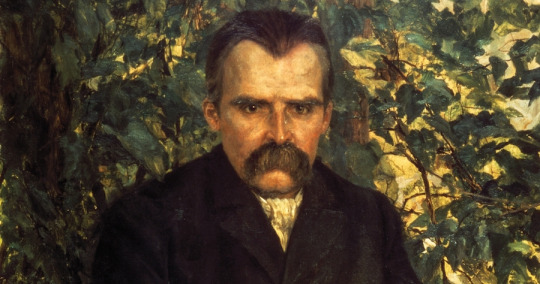
Having made the case for the impersonality of science (if not the self-abnegation of the scientist) in Scientific Self-Abnegation, it now remains to make the case for the uniquely personal, private, and idiosyncratic side of science—if indeed there is any such side of science, or if there is any such case to make.
What would an idiosyncratic scientific research program look like? It is not difficult to imagine, as for the greater part of the history of human science, scientific research programs were nothing more than the life work of a single man—an Archimedes, a Galileo, a Kepler, a Huygens, a Newton. This is the de facto condition of science in human history, but not necessarily the ideal of science, and not the reality of the large-scale research programs of big science that have come into being since the industrial revolution.
Scientific research programs in the time of Archimedes were the insights and ambitions of one man, but by the time of Newton there were printing presses, universities, scientific societies, and scientific journals (on which cf. Boundary Conditions of the Scientific Revolution). Newton had a community of scientific researchers to which he could communicate his work and from which he could anticipate an informed response. Even if Newton and his colleagues did not have the instantaneous global communications that we take for granted today, books did make their way around the world, and some scientists were well-traveled and worldly men in Newton’s day. And this was true to a much greater extent than was the case for Archimedes in classical antiquity.
Archimedes was a man a Syracuse, and his fate was tied to the fate of his city-state. The greatest institutions of learning of which we know from the pre-modern world—Plato’s Academy, the library at Alexandria, and the House of Wisdom in Baghdad—could be said to be regional centers of learning, or even centers on a civilizational scale that attracted the best minds within that civilization, but it is nothing like the international scientific collaboration of today.
Kenneth Clark made an astute observation related to this:
“The great churchmen of the eleventh and twelfth centuries came from all over Europe. Anselm came from Aosta, via Normandy, to be Archbishop of Canterbury; Lanfranc had made the same journey, starting from Pavia. The list could be extended to almost every great teacher of the early Middle Ages. It couldn’t happen in the Church, or politics, today: one can’t imagine two consecutive archbishops of Canterbury being Italian. But it could happen—does happen—in the field of science; which shows that where some way of thought or human activity is really vital to us, internationalism is accepted unhesitatingly.” (Civilisation: A Personal View, Harper & Row, 1969, p. 35)
Clark is right to point out that the church was an international institution (regionally confined to Europe) in the Middle Ages, and similarly the Roman world had its international institutions in the Mediterranean Basin in its time (though the use of “international” here is misleading and unhistorical). However, these earlier international institutions did not involve science, and despite their internationalism they were confined within a geographical region.
Science today thrives on a planetary scale, and so its institutions are planetary-scale institutions. But science began as a regional institution within Europe—this was science during the scientific revolution, from Copernicus to the industrial revolution—and before science was a regional institution, it was only the institution of gifted individuals and their immediate circle, if indeed a gifted individual had any circle at all. Many did not.
Previously I wrote about Nietzsche’s secret garden in Philosophies of the Secret Garden, in which I quoted the following:
“…out of my answers there grew new questions, inquiries, conjectures, probabilities—until at length I had a country of my own, a soil of my own, an entire discrete, thriving, flourishing world, like a secret garden the existence of which no one suspected. —Oh how fortunate we are, we men of knowledge, provided only that we know now to keep silent long enough!” (Nietzsche, On the Genealogy of Morals, translated by Walter Kaufmann, Preface, section 3)
I strongly identify with this. I have been working on my philosophical ideas in isolation for so many years that I have layers upon layers of concepts that are my own, so that concepts that I worked out several years ago I have since used to work out additional concepts that presuppose these earlier concepts. I have iterated this process to several generations with my own ideas, and this makes it extraordinarily difficult to explain what I am doing to others. Any explanation would make use of concepts that would have to be explained in turn.
It often happens that the bulk of a philosopher’s most original thoughts are to be found in their manuscripts. Probably every philosopher experiences what I have noted just above, and so holds back the strangest and least familiar flowers from his secret garden, instead presenting the public with only those arrangements that appear sufficiently conventional that they will not be rejected tout court.
Husserl wrote tens of thousands of pages in Gabelsberger shorthand, and Husserl’s industrious intellectual heirs have continued to transcribe, to edit, to publish, and to translate this enormous body of work almost a hundred years after this death. Godel’s notebooks, also written in Gabelsberger, are only now beginning to be transcribed and published (though they are already available in digitized form to anyone who can puzzle them out). I previously discussed these efforts in The arc of cognitive astrobiology is long, but it bends toward rationality. The impact of these philosophical efforts—the secret gardens of Husserl and Godel—will only be felt by the wider intellectual community in the coming century.
While philosophy in our time has started to follow the scientific model of international collaborative research, it is far behind science in this respect, and most philosophers doing truly original work do so in relative isolation, much as science was done in classical antiquity (though I might well argue that philosophy was an international collaboration in the ancient world, along the model that Clark described in the passage quoted above).
This is significant for science, because new scientific disciplines are suggested by novel philosophical research, and a new discipline in its nascent state is a fragile thing, easy destroyed if mishandled. It would be entirely understandable if a contemporary philosopher chose to work on ideas at the border of science and philosophy and kept this entirely to himself because this work would not likely be welcomed in either in the scientific community (being too philosophical) or in the philosophical community (being too scientific). Nevertheless, this is where most of the interesting ideas come from, and we tacitly and implicit rely on such efforts for the overall advancement of science.
I have often said that one of the advantages of the heightened individualism of western civilization is that it allows societies so organized to explore more possibilities at a lower social cost. Collectivist societies that insist upon joint social effort explore new possibilities at a high social cost, and failure can be catastrophic. This makes collectivist societies more risk averse than individualistic societies.
Additionally, the individualism of western civilization allows for the indulgence of eccentrics and splendid individuals, who, if they are successful, will be celebrated as individuals. And they may even be financially rewarded as individuals for their individual effort. Thus there is both a carrot and a stick for the individual researcher who attempts to make a contribution without being part of any wider research community.
The paradigm of “big science” represents a mainstreaming of a particular research program—a program that defines the wider research community—which enjoys disproportionately large social investments: university facilities, funding, personnel, equipment, etc. This has been crucial for the growth of what Kuhn called “normal science,” which is an enormous cooperative and collaborative effort. And with the conceptual framework of normal science being more comprehensive and more adequate than ever before in the past, normal science practiced as big science can continue almost indefinitely.
This potentially indefinite growth of normal science has been further facilitated by an awareness of Kuhnian philosophy of science, and this has meant that scientists are more clearly aware than at any previous time of the ellipses incorporated into the body of scientific knowledge, and many are open to considering alternative theories as long as those theories are competently expressed in the technical jargon of the discipline. We know that general relativity and quantum theory cannot be brought together in our current physics framework, and we know that we cannot explain large-scale cosmology (which often invokes “dark matter” and “dark energy,” which are merely ciphers that mean, “something to explain gravitational anomalies” and “something to explain the accelerating expansion of the universe”), so that the scientific community is actively seeking more adequate formulations of these problems.
Be that as it may, the most striking developments of science are likely to come out of the work of philosophical scientists (as indeed the theories of relativity and gravitation came out of Einstein’s work, and Einstein has rightly been called a “philosopher-scientist”), and these philosophical scientists will probably develop the most crucial and distinctive concepts that later serve to advance science in a Nietzschean secret garden of their own.
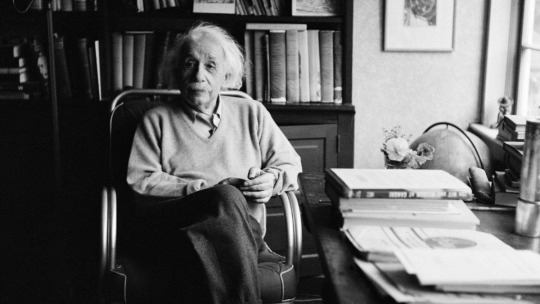
#Nietzsche#Friedrich Nietzsche#Kenneth Clark#science#history of science#scientific research program#individualism
0 notes
Note
r/Edelgard seems to have completely turned against Claude now. But the weirdest part is that they keep calling him an imperialist, while at the same time denying Edelgard is one.
It was only a matter of time before they did honestly. While Dimitri and Edelgard more directly oppose each other ideologically, even if it’s merely stated as so by the game Claude and Edelgard are presented as being “closer aligned” in terms of ideals, and any character shown to be a potential ally to Edelgard is seen in a good light in their eyes and any character that is shown to be unable to be an ally is a villain/bad person, so he was given some leeway until recently.
Look at how they bend themselves trying to make AM the villain route, how they sometimes completely discard Rhea’s words in favor of Edelgard’s despite the former literally being present when history was happening and the latter having Imperial Telephone tell her the totes fer reel correct version that happens to paint humanity as pure good, at how Edelgard’s treatment of Seteth and Flayn is excused and sometimes justified, at how Dimitri defending his land against an invading force that has the explicit goal of conquering them is painted in the worst possible light. It’s a consistent tendency to put down every character that could even potentially make Edelgard look bad... so Claude was never going to escape this treatment forever, since he arguably makes Edelgard look the worst. Not because of what she did to him - that trophy is being valiantly fought by Dimitri and Rhea - but because of his actions and goals and accomplishments compared to hers.
Remember Edelgard’s supposed goals, according to her stans? Claude does them, with far more peaceful results.
“Reform the Church” - Edelgard gets rid of it entirely in the majority of her endings and has it state-sanctioned if she does allow it to stay all the while actively persecuting the faithful in the Empire during the war, Claude always has the Church around and it is stated to be going through more natural reforms under Byleth and Seteth’s guidance and like the rest of the non-CF routes gives refuge to the said persecuted faithful.
“Unify Fodlan” - Edelgard forcefully unites Leicester and Faerghus back under Adrestia’s banner and erases their cultures while doing so, Claude unites Leicester, Faerghus, and Adrestia under a new banner (the United Kingdom of Fodlan) with no explicit mention of the erasure of the former nations (unlike “the Holy Kingdom of Faerghus and the Church of Seiros both vanished from the people’s memories” like in CF’s ending narration).
“Reveal the truth of Fodlan’s history” - Edelgard only tells a “truth” that goes directly against everything established by the game’s foreshadowing and never looks farther into what she assumes to be true, Claude finds the actual truth and does so by asking Rhea, someone who would for sure know the truth of what happened (all while risking the chance of her blowing away his previous assumptions of what’s been happening)
“Reveal the truth of Fodlan part 2″ - Edelgard/CF has multiple instances that reveal that portions of history are being deliberately covered up (Dorothea/Edelgard endings revealing censorship, Ferdinand/Byleth endings revealing certain battles not being recorded “ History books extol Ferdinand's success as a lord of his territories, but they do not make mention of the hard-fought battles he endured alongside his wife. Thus, half of his life's work is lost to time”), no mention of such things happening in Claude/VW’s endings
“Better relations with Almyra” - this is a throwaway line in Edelgard’s story that is completely optional and easy to miss as well as never appearing in any of her endings whatsoever (as well as any mention of bettering foreign relations), this is Claude’s entire goal which he is stated and even somewhat shown to have accomplished in the course of his story
“Looking out for the weak” - Edelgard intentionally strips the weak of support by taking away most any semblance of a church and explicitly states that the weak will inevitably learn how to grow strong by themselves, Claude acknowledges the Church’s importance to the people even if he personally doesn’t like religion and explicitly believes that strength is found by relying on, opening up to, and believing in friends and close ones
“Looking out for the weak, part 2″ - Edelgard explicitly states that she is completely willing to sacrifice her men as well as the people of Fodlan as a whole in order to achieve a greater good and then goes on to endanger her people, Claude explicitly states that such methods are too bloody and goes on to go out of his way to protect the people through evacuation or by placing himself in front of them or keeping them out of the fighting entirely
“Achieving a peaceful Fodlan” - The majority of Hubert’s endings reveal the need to constantly spy on the populace and/or put down rebellions/assassination attempts, the only mention of something similar occurring in VW is putting down Imperial loyalists + TWS’ attempts to disrupt the peace
“Wanting help from others” - Edelgard never attempts to reach out a hand in friendship to anyone at any point of the game, Claude tries multiple times to do so with Dimitri and actually succeeds in doing so in AM (not to mention him giving his help to and asking for help from the Church in non-CF routes)
This is just what I can readily think of off the top of my head, but we see that Claude manages to accomplish much of what Edelstans say Edelgard wants to do with better results, and that’s not even getting into how Claude needs no “softening” from Byleth in order to be a more approachable person, how he never initiates fighting towards Faerghus (as in, not the Kingdom army but the nation itself, unlike Edelgard) and never tries to conquer it whatsoever (again, unlike Edelgard), how he keeps his word and assists in helping Rhea despite not liking or trusting her unlike how Edelgard claims to want to make peace with Rhea despite thinking that her and her kind need destruction, how Claude mourns the deaths of his friends and allies while Edelgard says nothing if any of her friends and allies die (even Hubert, someone she’s known for close to 20 years, one of the longest relationships of the academy students’ circle. she says nothing of his passing) save for Bernadetta whom she can set on fire, and, again, other things that aren’t coming to my right off the cuff. He makes her look horrible
And, well, ya know what that means. Claude’s actions can’t be actually good, because they make Edelgard, the hero of 3H, look bad, so there has to be some kind of catch everywhere.
Claude bringing in Almyran reinforcements, with the approval of the Alliance’s most renown general, to help secure Fort Merceus in a more secure way (and is actually shown to have possibly actually helped in pulling off the ruse, seeing how SS tried the same thing without them and failed)? Him doing the same in some of his endings, where he sends Almyran forces to help settle the Imperial revolts that are happening? This is actually him trying to invade Fodlan, sending Almyran forces as a show of force and establish Almyra’s superiority over Fodlan, not him showing that Almyra wishes to help Fodlan reform so that their centuries long feud can finally begin to be properly set aside and allow for positive change to occur between the two countries.
Claude keeping the Alliance out of the war? This is actually him biding his time to strike back against both countries so that he can win the war and he only succeeds if he manages to trick Byleth and the Church (and Dimitri, in AM) into helping him, not him recognizing that the Alliance is weak even if fully united (let alone in the divided state they’re in) and wanting to keep his people as far away from the war as possible.
Claude giving the leadership of Fodlan to Byleth? This is actually him giving an ambitionless puppet rulership so that he can control Fodlan through them (even though even pre ts he doesn’t believe Byleth has no ambitions and will full on deny the belief that they don’t) and not him putting his faith in Byleth that they will be able to rule Fodlan justly
Claude showing concern over his friends’ wellbeing? This is actually him only trying to make sure his “tools” are kept up nicely, not him genuinely caring about those around him.
Claude coming across as insensitive in his Jeralt’s diary scene? This is actually proof/a hint of Claude’s true persona as a manipulative sociopath, not a genuine fuck up on his end (or, if you want to be nicer, a look into how he himself deals with traumatic events, though that’s up for interpretation so not the main point)
Claude saying that he wants to be supreme ruler of the world to Edelgard? This is actually him outright revealing his plans and showing regret that Edelgard managed to thwart him.
Oh, and we can’t forget how Claude actually wanted to wage war himself and was only stopped by Edelgard, and how he stole all of the progress Edelgard was making in changing Fodlan’s society, and how he never would have been able to do anything without Edelgard, and how him not siding with Edelgard is proof that he never wanted the best for Fodlan, and how the warmongering Almyrans would never want to make peace with Fodlan with that being more proof of Claude’s “true” ill intentions since he’d totally know that’d be the case
The second to last point being, of course, the only time you should take Claude at face value. And again, these are just the points that readily come to my mind as of right now.
Like I said, there was no chance in hell Claude was going to stay in r/Edelgard’s good graces, given how so much of his character directly shits on Edelgard’s. Friendship ended with r/Edelgard, now Dimitri and Rhea are Claude’s best friends.
#ask#anti edelgard#Anti-edelgard#Edelgard discourse#edelgard critical#just to be safe#like yeah I'm surprised Claude went this long without being shat on
36 notes
·
View notes